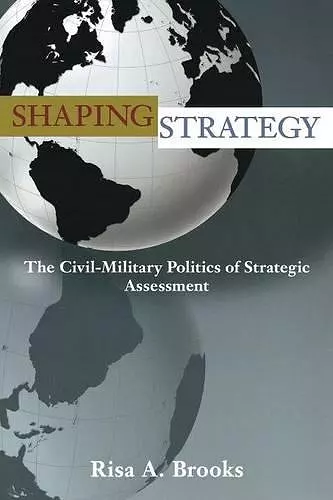Shaping Strategy
The Civil-Military Politics of Strategic Assessment
Format:Paperback
Publisher:Princeton University Press
Published:13th May '08
Currently unavailable, and unfortunately no date known when it will be back

Brooks has made a significant contribution to the study of decision making and military strategy. Her case studies repeatedly demonstrate how pathologies in civil-military relations produce ineffective decisions in crises and conflicts. -- Scott D. Sagan, Stanford University Brooks articulates the problem of strategic assessment in a new way, does a very good review of the literature, introduces a simple model with profound implications, and makes a compelling case for her claims. Her general argument--that strategic assessment varies with the balance of power between civilian and military leaders and the degree to which their preferences diverge--is intriguing. -- Deborah Avant, University of California, Irvine Risa Brooks's theory of why some states are good at strategic assessment while others are not is novel, persuasive, nuanced, and elegant. Her discussion of the failure of U.S. strategic assessment following the second Iraq war shows that this issue is of much more than theoretical relevance. This book is an important contribution to the study of civil-military relations and strategic decision making. -- Michael Desch, Texas A&M University
Drawing insights from both international relations and comparative politics, this book shows that good strategic assessment depends on civil-military relations that encourage an easy exchange of information and an analysis of a state's own relative capabilities and strategic environment.Good strategic assessment does not guarantee success in international relations, but bad strategic assessment dramatically increases the risk of disastrous failure. The most glaring example of this reality is playing out in Iraq today. But what explains why states and their leaders are sometimes so good at strategic assessment--and why they are sometimes so bad at it? Part of the explanation has to do with a state's civil-military relations. In Shaping Strategy, Risa Brooks develops a novel theory of how states' civil-military relations affect strategic assessment during international conflicts. And her conclusions have broad practical importance: to anticipate when states are prone to strategic failure abroad, we must look at how civil-military relations affect the analysis of those strategies at home. Drawing insights from both international relations and comparative politics, Shaping Strategy shows that good strategic assessment depends on civil-military relations that encourage an easy exchange of information and a rigorous analysis of a state's own relative capabilities and strategic environment. Among the diverse case studies the book illuminates, Brooks explains why strategic assessment in Egypt was so poor under Gamal Abdel Nasser prior to the 1967 Arab-Israeli war and why it improved under Anwar Sadat. The book also offers a new perspective on the devastating failure of U.S. planning for the second Iraq war. Brooks argues that this failure, far from being unique, is an example of an assessment pathology to which states commonly succumb.
"Risa Brooks develops a novel theory of how states' civil-military relations affect strategic assessment during international conflicts. And her conclusions have broad practical importance."--Spartacus Educational "Shaping Strategy is a major contribution."--Todd S. Sechser, Perspectives on Politics
ISBN: 9780691136684
Dimensions: unknown
Weight: 454g
328 pages